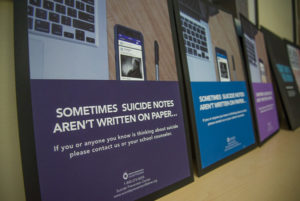Graphic Design Students Develop Suicide Awareness Posters
Wednesday, October 5, 2016
Graphic design students at Pennsylvania College of Technology used their skills to create suicide awareness posters to mark September as National Suicide Prevention Awareness Month.
"While this was a difficult project in terms of both subject and design solution, ultimately, I think the students got a lot out of the experience and learned just how impactful graphic design can be in terms of public awareness and education,” said Nicholas L. Stephenson, instructor of graphic design.
 As part of their design research, Stephenson and students in the Advanced Computer Graphics course worked with Mallory L. Weymer, coordinator of student health and wellness education/suicide prevention specialist, and Brian J. Schurr, counselor, to gain a better understanding of suicide prevention and the importance of hope for those who are struggling. The students participated in QPR (question, persuade, refer) suicide prevention training led by the two college professionals.
As part of their design research, Stephenson and students in the Advanced Computer Graphics course worked with Mallory L. Weymer, coordinator of student health and wellness education/suicide prevention specialist, and Brian J. Schurr, counselor, to gain a better understanding of suicide prevention and the importance of hope for those who are struggling. The students participated in QPR (question, persuade, refer) suicide prevention training led by the two college professionals.
 “The poster design project was such a great opportunity for students to not only learn about suicide prevention and all the different risk factors and warning signs, but also how to effectively communicate a challenging message,” Weymer said. “I have been so impressed by how these students have put the work in to really explore and understand suicide prevention and the best way to reach their intended audience. As a society, we don’t talk about suicide, and there is a great stigma that still exists even mentioning the word, but research shows that communicating about this issue allows people to feel safe and talk about their struggles. The work that these students have done has the potential to save lives and change the way people think about depression and suicide, and that’s such a powerful thing.”
“The poster design project was such a great opportunity for students to not only learn about suicide prevention and all the different risk factors and warning signs, but also how to effectively communicate a challenging message,” Weymer said. “I have been so impressed by how these students have put the work in to really explore and understand suicide prevention and the best way to reach their intended audience. As a society, we don’t talk about suicide, and there is a great stigma that still exists even mentioning the word, but research shows that communicating about this issue allows people to feel safe and talk about their struggles. The work that these students have done has the potential to save lives and change the way people think about depression and suicide, and that’s such a powerful thing.”
 Students were assigned an 11-by-17-inch poster as their delivery medium and asked to develop the messaging, imagery, call to action and strategy for their project.
Students were assigned an 11-by-17-inch poster as their delivery medium and asked to develop the messaging, imagery, call to action and strategy for their project.
“These posters and the messaging that the students developed have the potential to make a real difference in the lives of someone struggling with depression and/or thoughts of suicide," Stephenson said. “The project required exhaustive research and a very mature design sensibility. This is arguably the most difficult design project that I have ever assigned, and overall, I could not be more impressed with the work that was produced. Design like this makes me proud to be a teacher and humbles me that I have an opportunity to work with such great students.”
 Weymer, a 2010 graphic design alumna and an adjunct faculty member in the major, said she plans to use some of the posters for the Penn College SPIRIT (Suicide Prevention through Information, Referral, Intervention and Training) Project. The project is in the second year of a three-year grant managed by the Center for Mental Health Services in Substance Abuse and Mental Health Services Administration, a U.S. Department of Health and Human Services agency. The Penn College SPIRIT Project is receiving a total of $306,000 via the SAMHSA Garrett Lee Smith Memorial Campus Suicide Prevention Grant.
Weymer, a 2010 graphic design alumna and an adjunct faculty member in the major, said she plans to use some of the posters for the Penn College SPIRIT (Suicide Prevention through Information, Referral, Intervention and Training) Project. The project is in the second year of a three-year grant managed by the Center for Mental Health Services in Substance Abuse and Mental Health Services Administration, a U.S. Department of Health and Human Services agency. The Penn College SPIRIT Project is receiving a total of $306,000 via the SAMHSA Garrett Lee Smith Memorial Campus Suicide Prevention Grant.
To learn more about the graphic design and art majors at Penn College, visit the School of Sciences, Humanities & Visual Communications.
For more about Penn College, a national leader in applied technology education and workforce development, email the Admissions Office or call toll-free 800-367-9222.
"While this was a difficult project in terms of both subject and design solution, ultimately, I think the students got a lot out of the experience and learned just how impactful graphic design can be in terms of public awareness and education,” said Nicholas L. Stephenson, instructor of graphic design.
 As part of their design research, Stephenson and students in the Advanced Computer Graphics course worked with Mallory L. Weymer, coordinator of student health and wellness education/suicide prevention specialist, and Brian J. Schurr, counselor, to gain a better understanding of suicide prevention and the importance of hope for those who are struggling. The students participated in QPR (question, persuade, refer) suicide prevention training led by the two college professionals.
As part of their design research, Stephenson and students in the Advanced Computer Graphics course worked with Mallory L. Weymer, coordinator of student health and wellness education/suicide prevention specialist, and Brian J. Schurr, counselor, to gain a better understanding of suicide prevention and the importance of hope for those who are struggling. The students participated in QPR (question, persuade, refer) suicide prevention training led by the two college professionals. “The poster design project was such a great opportunity for students to not only learn about suicide prevention and all the different risk factors and warning signs, but also how to effectively communicate a challenging message,” Weymer said. “I have been so impressed by how these students have put the work in to really explore and understand suicide prevention and the best way to reach their intended audience. As a society, we don’t talk about suicide, and there is a great stigma that still exists even mentioning the word, but research shows that communicating about this issue allows people to feel safe and talk about their struggles. The work that these students have done has the potential to save lives and change the way people think about depression and suicide, and that’s such a powerful thing.”
“The poster design project was such a great opportunity for students to not only learn about suicide prevention and all the different risk factors and warning signs, but also how to effectively communicate a challenging message,” Weymer said. “I have been so impressed by how these students have put the work in to really explore and understand suicide prevention and the best way to reach their intended audience. As a society, we don’t talk about suicide, and there is a great stigma that still exists even mentioning the word, but research shows that communicating about this issue allows people to feel safe and talk about their struggles. The work that these students have done has the potential to save lives and change the way people think about depression and suicide, and that’s such a powerful thing.” Students were assigned an 11-by-17-inch poster as their delivery medium and asked to develop the messaging, imagery, call to action and strategy for their project.
Students were assigned an 11-by-17-inch poster as their delivery medium and asked to develop the messaging, imagery, call to action and strategy for their project.“These posters and the messaging that the students developed have the potential to make a real difference in the lives of someone struggling with depression and/or thoughts of suicide," Stephenson said. “The project required exhaustive research and a very mature design sensibility. This is arguably the most difficult design project that I have ever assigned, and overall, I could not be more impressed with the work that was produced. Design like this makes me proud to be a teacher and humbles me that I have an opportunity to work with such great students.”
 Weymer, a 2010 graphic design alumna and an adjunct faculty member in the major, said she plans to use some of the posters for the Penn College SPIRIT (Suicide Prevention through Information, Referral, Intervention and Training) Project. The project is in the second year of a three-year grant managed by the Center for Mental Health Services in Substance Abuse and Mental Health Services Administration, a U.S. Department of Health and Human Services agency. The Penn College SPIRIT Project is receiving a total of $306,000 via the SAMHSA Garrett Lee Smith Memorial Campus Suicide Prevention Grant.
Weymer, a 2010 graphic design alumna and an adjunct faculty member in the major, said she plans to use some of the posters for the Penn College SPIRIT (Suicide Prevention through Information, Referral, Intervention and Training) Project. The project is in the second year of a three-year grant managed by the Center for Mental Health Services in Substance Abuse and Mental Health Services Administration, a U.S. Department of Health and Human Services agency. The Penn College SPIRIT Project is receiving a total of $306,000 via the SAMHSA Garrett Lee Smith Memorial Campus Suicide Prevention Grant.To learn more about the graphic design and art majors at Penn College, visit the School of Sciences, Humanities & Visual Communications.
For more about Penn College, a national leader in applied technology education and workforce development, email the Admissions Office or call toll-free 800-367-9222.
